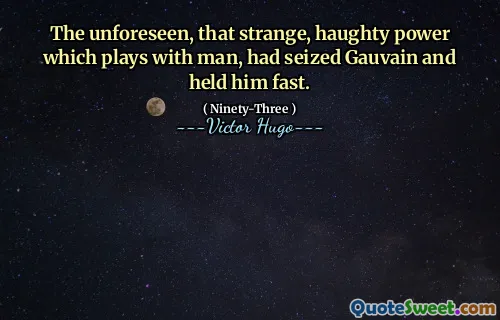
The unforeseen, that strange, haughty power which plays with man, had seized Gauvain and held him fast.
In Victor Hugo's "Ninety-Three," the character Gauvain is portrayed as a victim of an unpredictable force that manipulates human fate. This “unforeseen” power acts with arrogance and seems to toy with Gauvain's life, reflecting the broader themes of chaos and inevitability during turbulent times. The phrase suggests that individuals often find themselves at the mercy of circumstances beyond their control.
This idea emphasizes the struggle of man against the whims of fate, highlighting the human experience during the revolutionary period depicted in the novel. Gauvain's entrapment by this haughty power underscores the tension between personal agency and external forces, illustrating the challenges individuals face when navigating their destinies within a chaotic world.






